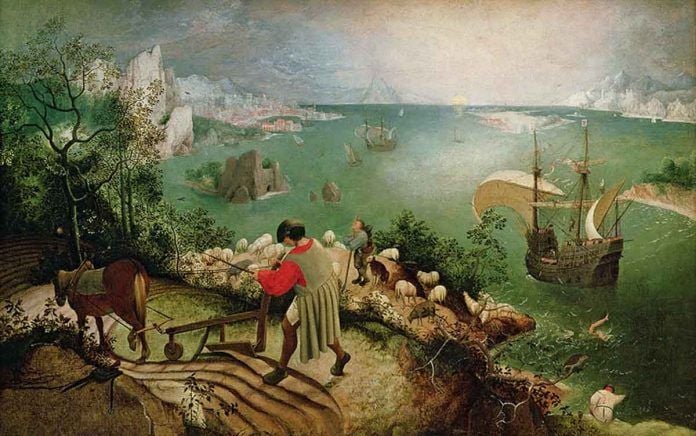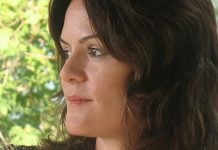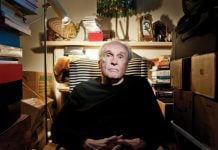Musée des Beaux Arts
Sobre el sufrimiento no se equivocaron nunca
los Viejos Maestros: qué bien comprendieron
su lugar entre los humanos; cómo se sufre
en tanto que otros comen o abren una ventana
o se pasean tediosamente sin prisa; cómo,
mientras los ancianos esperan con fervor y pasión
el nacimiento milagroso, debe haber siempre niños
que no quieran que esto en particular suceda
y se la pasan patinando en un estanque
al borde de la floresta.
Nunca olvidaron los Viejos Maestros
que hasta el martirio más espantoso
debe continuar a cualquier precio su curso
en una esquina, en algún desaliñado paraje
donde los perros sigan con su vida de perro
y el caballo del torturador
se rasque su inocente trasero contra un árbol.
Véase, por ejemplo, en el Ícaro de Brueghel, cómo todo
se desentiende con calmada parsimonia del desastre:
el labrador pudo haber escuchado el chapoteo, el grito
de desamparo, pero para él esto no era
un fracaso importante;
el sol brillaba, como era su obligación, sobre las blancas
piernas que desaparecían en las verdes aguas; y la nave
lujosa y delicada que debió haber visto algo asombroso
–un muchacho cayendo desde el cielo–
tenía que llegar a su destino y navegaba con calma.
Musée des Beaux Arts
About suffering they were never wrong,
The Old Masters: how well they understood
Its human position; how it takes place
While someone else is eating or opening a window
or just walking dully along;
How, when the aged are reverently, passionately waiting
For the miraculous birth, there always must be
Children who did not specially want it to happen, skating
On a pond at the edge of the wood:
They never forgot
That even the dreadful martyrdom must run its course
Anyhow in a corner, some untidy spot
Where the dogs go on with their doggy life,
and the torturer’s horse
Scratches its innocent behind on a tree.
In Breughel’s Icarus, for instance: how everything
turns away
Quite leisurely from the disaster; the ploughman may
Have heard the splash, the forsaken cry,
But for him it was not an important failure;
the sun shone
As it had to on the white legs disappearing
into the green
Water; and the expensive delicate ship
that must have seen
Something amazing, a boy falling out of the sky,
Had somewhere to get to and sailed calmly on.
En soledad
Cada amante tiene su propia teoría
sobre la diferencia entre estar solo
y el dolor de estar con su amor.
¿Por qué lo que en el sueño es amada carne y hueso
que agita ardientemente los sentidos,
al despertar parece un simulacro de uno mismo?
No cree Narciso en lo desconocido;
no se unirá jamás a su imagen en el lago
mientras asuma que está solo.
Sin embargo, el niño, la cascada, el fuego, la piedra,
están siempre dispuestos a cualquier travesura
y dan como propio el universo entero.
Los ancianos, como Proust, suelen ser propensos
a ver el amor como un engaño personal,
y cuanto más aman, más se sienten solos.
Sea cual fuere nuestra opinión, hay que afirmar
que cada amante desea convertir
toda forma de alteridad en algo propio.
Tal vez, en realidad, no estamos nunca solos.
Alone
Each lover has some theory of his own
About the difference between the ache
Of being with his love, and being alone.
Why what, when dreaming, is dear flesh and bone
That really stirs the senses, when awake,
Appears a simulacrum of his own.
Narcissus disbelieves in the unknown;
He cannot join his image in the lake
So long as he assumes he is alone.
The child, the waterfall, the fire, the stone,
Are always up to mischief, though, and take
The universe for granted as their own.
The elderly, like Proust, are always prone
To think of love as a subjective fake;
The more they love, the more they feel alone.
Whatever view we hold, it must be shown
Why every lover has a wish to make
Some other kind of otherness his own:
Perhaps, in fact, we never are alone.
|
Colabora con nuestro trabajo Somos una asociación civil de carácter no lucrativo, que tiene por objeto principal la promoción y fomento educativo, cultural y artístico. En Rialta nos esforzamos por trabajar con el mayor rigor profesional en la gestión, procesamiento, edición y publicación de los contenidos y la información. Todos nuestros contenidos web son de acceso libre y gratuito. Cualquier contribución es muy valiosa para nuestro futuro. ¿Quieres (y puedes) apoyarnos? Da clic aquí. ¿Tienes otras ideas para ayudarnos? Escríbenos al correo [email protected]. |












